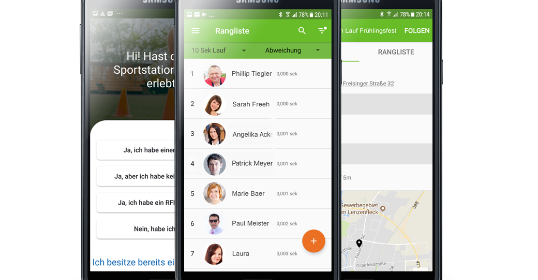What are proprietary enterprise mobile applications for? How to distribute these applications to employees? And should companies provide employees with devices or require them to bring their own?
What are enterprise mobile applications for?
Enterprise mobile applications are meant for internal use within the company. They streamline doing business by bringing together all the processes.
Examples of an enterprise mobile app
- Applications to supervise contractors at a construction site;
- In-store survey apps;
- Apps for merchandising audit;
- Field reporting applications;
- Applications with reference information;
- Applications for employee communication on work-related questions.
5 reasons for enterprise mobile application development
- To skip the paperwork and free up employees from transferring these data to a digital format;
- To enable photo and video recording;
- To provide an employee with the most relevant information about the task online;
- To manage dynamic data;
- To avoid communication issues within the company.
A corporate mobile application should be based on a business logic that allows performing the tasks of each department and employee with minimal costs and maximum efficiency. To increase the efficiency of the application and help the business to grow, identify weak points, analyze business processes preliminarily and optimize them.
Should companies provide employees with devices or require them to bring their own?
Advantages of purchasing devices
- Development in a single native language
If you don’t purchase devices for employees, you need to develop the application both on iOS and Android. Of course, now it’s possible to use Flutter or ReactNative to develop on two platforms at once. But in practice, applications in non-native languages are more suitable for simple solutions where information from the server should be displayed. There are cases when the application has to work with poor internet or no internet at all, for example, in the construction industry (a car park, a site outside the city), in supermarkets (jammers on site), etc. In such cases, the application needs to store a large amount of data (photos, videos) until the Internet restores, otherwise, all the work done will be lost. For such applications, we recommend using the native languages Swift, Kotlin, Java.
- Simple support
Most likely, some of your employees have old gadgets. When purchasing devices, there is no problem with maintaining outdated technologies. You will know what performance you should count on and be confident in the performance of the system.
- Users will not complain that there is no free space on their devices
Seems that in 2021 it’s not a problem, but the fact is users save megabytes.
- The ability to set up MDM (Mobile Device Management)
You will be able to control all device data: geolocation, usage time, files, blocking. Install and update applications, restrict website visits.
Cons:
- You will have to spend money on purchasing devices and accessories for them (cases, chargers);
- You will need to keep records of devices and establish the process of issuing;
- You need to buy SIM cards and top up the balance.
How to distribute enterprise mobile applications to employees?
The security team often prohibits distributing corporate mobile applications in Google Play and AppleStore. There are also the companies that don’t want to opt for the open distribution for the following reasons:
- Sensitive data (security requirements increase because any user can download);
- Customers and competitors can see the company's applications;
- Dependence on the moderation from Apple or Google (sometimes an application can be under moderation for 1-2 weeks due to constant addition of new requirements).
And if to Android users you can simply send a link or file to download, then with iOS app development it’s much more difficult. You have two options here:
Apple Developer Program ($100 per year)
Apple Developer Program suits you if the number of employees who will use the application is lower than 100. Employees install the application through the TestFlight program and become its internal testers. Keep in mind that if there are more than 100 employees, the application will pass Apple moderation and go to the public AppStore.
Pros: low cost, no moderation, and no legal approval.
Cons: the limited number of users.
Apple Developer Enterprise Program ($299 per year)
The best way is to use the Apple Developer Enterprise Program. After passing legal procedures, you can send a download link (outside the AppStore). You don't have to wait for moderation, and most importantly, you can use over 100 users without public access.
Pros: the unlimited number of users.
Cons: the cost of service and legal restrictions on use.
Bottom Line
Ask yourself a few questions before a proprietary enterprise mobile app development:
- For which operating systems do you want to develop an application?
- Are you ready to purchase devices and pay for mobile services?
- How many employees will use the app? And where will you distribute your application?
The advantages of implementing corporate mobile applications are obvious. But there are still fears that prevent some managers from digitalization. There is also a danger of sabotage by workers or a decrease in motivation if the staff is conservative. Employees are not always happy with innovations requiring a new collaborative culture in the company, and a leader himself may be at the head of such ideation.
But today, even if your company has a great past, even if it is an integral part of the country’s infrastructure, there is a risk of losing its advantage overnight. Young companies with an agile approach and creative products can overtake clumsy conservatives at once.
As stated in a press release from the British airline company Thomas Cook Airlines Limited, they could not compete with online services. This is happening everywhere. During the lockdown in many industries, only the companies that have mastered the technology have survived. And the companies that had implemented corporate digital systems before the coronavirus were the least affected and quickly moved their work to remote locations. Today it is obvious that there is no turning back, and corporate mobile applications in any company are only a matter of time.
Belitsoft specializes in mobile application development. If your business is ready to level up in enterprise technologies and competitiveness, contact us for a free quote.
Rate this article
Recommended posts
Portfolio

Our Clients' Feedback






















.png)
.png)
.jpg)
.jpg)
.png)





















Belitsoft has been the driving force behind several of our software development projects within the last few years. This company demonstrates high professionalism in their work approach. They have continuously proved to be ready to go the extra mile. We are very happy with Belitsoft, and in a position to strongly recommend them for software development and support as a most reliable and fully transparent partner focused on long term business relationships.
Global Head of Commercial Development L&D at Technicolor